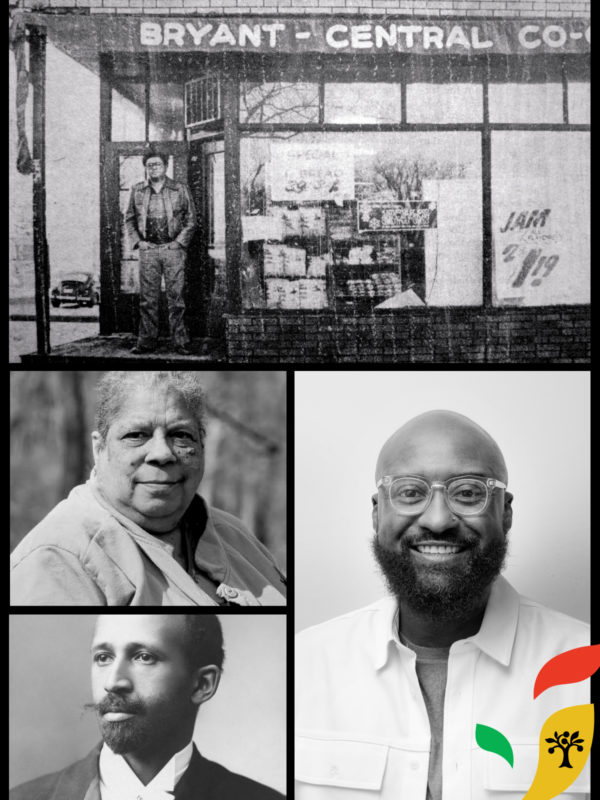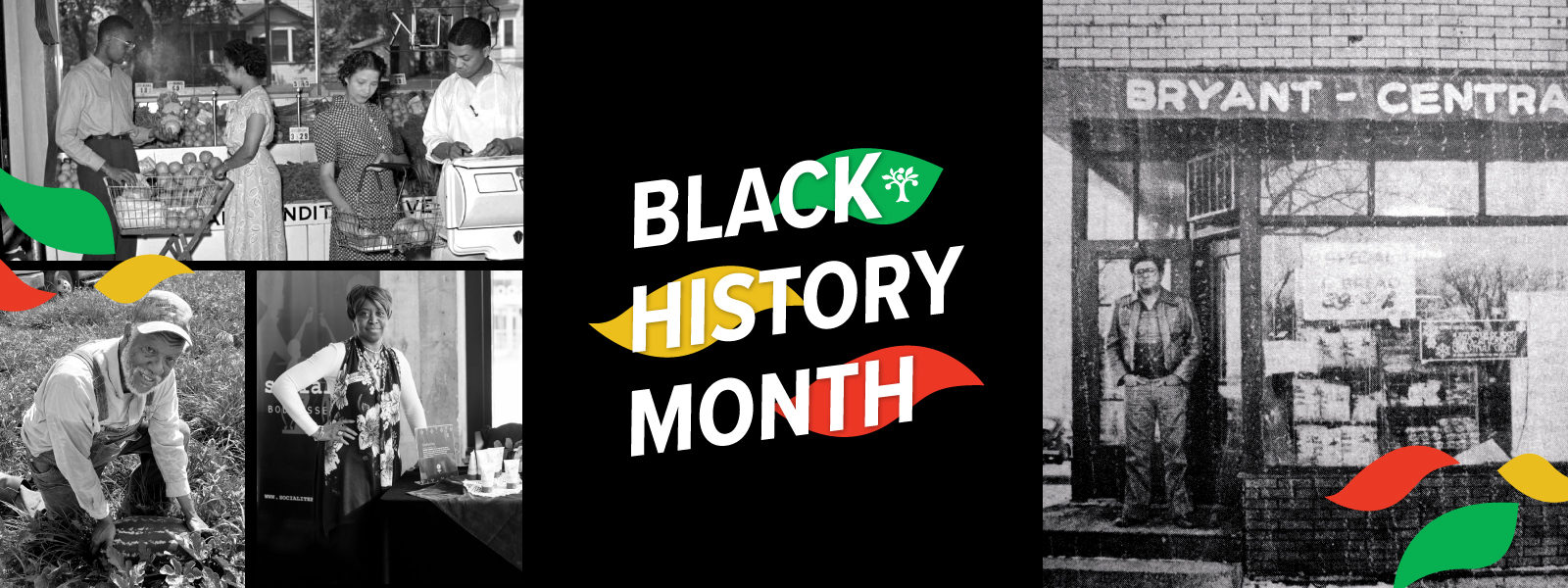We’re honored to support Black- and African-American-owned businesses across our stores, from food producers to wellness vendors. While Black History Month is a noted time to celebrate inclusively-owned businesses, we are always committed to pursuing a food economy and community rooted in equity, inclusion, and socially and environmentally responsible practices. At Seward Co-op, our Ends Statement guides the decisions we make, and we are dedicated to the values it affirms year-round.
Honoring Black History Month 2023
 Support Local, Black-Owned Urban Farming
Support Local, Black-Owned Urban Farming
LUV Microgreens is a Minneapolis-based, Black-owned, small-scale urban microgreens farm specializing in growing nutritious infant plants from pea shoots to spicy mixes of various greens and more. The seeds for LUV Microgreens were first planted when owner Richard Gordon began a garden in the backyard of his grandmother’s home. After exploring a budding interest in indoor farming and discovering microgreens, Richard began LUV. Today, Richard grows his microgreens in the Twin Cities hydroponically and free from pesticides, fertilizers, and herbicides, using certified compostable containers and offering reusable mason jars as a method for delivery.
As one of our Community Foods vendors, LUV Microgreens is committed to sustainable, local, urban farming in a Black-owned space. Richard says: “We believe that by demonstrating a successful business model of artfully producing and distributing micro-greens as Black farmers within Black communities we will help our communities continue to forward the struggle to take back control over our own health, access to wealth and economic mobility.”
Next time you visit our Franklin and Friendship stores, be on the lookout for LUV Microgreens’ pea shoots or Brass Mix, which includes kale, kohlrabi, red cabbage, broccoli, and arugula. Fresh, petite, and colorful, microgreens pair great with pizza, salads, sandwiches, tacos, and more.
Honoring Black Cooperation Throughout History and Today
Before capitalism became our society’s primary economic structure, cooperation–and cooperative economics–provided a framework for us to live and work together. Having shared ownership and a shared stake of outcomes allows people to come together to create change within communities. Throughout history, cooperative economics have provided opportunities for marginalized individuals to find pathways to equity.
 This Black History Month, we aim to uplift the contributions of early and present-day Black cooperators like W.E.B. Du Bois, who was a co-founder of the NAACP and founded the Negro Cooperative Guild in 1918. Considered one of the greatest thinkers of his time, he wrote about cooperative economics as road to equity for African Americans. Halena Wilson was a cooperative educator and worked to empower women within the cooperative movement in the middle of the century. She helped open buying clubs, credit unions, and consumer co-ops throughout the Chicago area. Locally, Moe Burton was the founder of the Bryant-Central Co-op. His work with the Black Panthers and Socialist Workers Party led him to cooperation as a tool for creating food access. The Bryant-Central Co-op created jobs and provided cost-effective food options in an area that previously lacked access. Annie Young’s legacy in the local co-op movement is far-reaching. Her early experience of starting a buying club to feed those she was living with in Sioux Falls, S. D. prepared her for the work she would ultimately do at the People’s Warehouse at the height of the Co-op Wars. Later, she filled the role of Membership Coordinator at Seward Co-op. Not only did she boost membership, but she also established the membership number system that’s in use in Seward Co-op stores today. Later, she served as the president of our board of directors.
This Black History Month, we aim to uplift the contributions of early and present-day Black cooperators like W.E.B. Du Bois, who was a co-founder of the NAACP and founded the Negro Cooperative Guild in 1918. Considered one of the greatest thinkers of his time, he wrote about cooperative economics as road to equity for African Americans. Halena Wilson was a cooperative educator and worked to empower women within the cooperative movement in the middle of the century. She helped open buying clubs, credit unions, and consumer co-ops throughout the Chicago area. Locally, Moe Burton was the founder of the Bryant-Central Co-op. His work with the Black Panthers and Socialist Workers Party led him to cooperation as a tool for creating food access. The Bryant-Central Co-op created jobs and provided cost-effective food options in an area that previously lacked access. Annie Young’s legacy in the local co-op movement is far-reaching. Her early experience of starting a buying club to feed those she was living with in Sioux Falls, S. D. prepared her for the work she would ultimately do at the People’s Warehouse at the height of the Co-op Wars. Later, she filled the role of Membership Coordinator at Seward Co-op. Not only did she boost membership, but she also established the membership number system that’s in use in Seward Co-op stores today. Later, she served as the president of our board of directors.
Today, we are honored to welcome our first Black General Manager, Raynardo Williams, to the co-op. Ray has held many leadership roles at our co-op over the last seven years. He is dedicated to our Ends and has showcased his commitment to the co-op and exemplified his flexibility in times of difficult change and community unrest. This is also a monumental step for our co-op that exemplifies our ongoing commitment to diversity, equity, and inclusion within the cooperative movement. After a year of celebrating our 50th anniversary, we cannot diminish the historic nature of Ray stepping into his role as the first Black GM in Seward Co-op’s history. Together, Ray and Seward Co-op are making Black history and showing the world what modern cooperative leadership looks like.
Further Reading on Black Cooperative History
The Legacy of African Americans in Co-ops
Jessica Gordon Nembhard: Cooperative Economics and Civil Rights
Black History Month Virtual Dinner Series
 Celebrate Black History Month with Addie from Seward Co-op as she shares Sunday dinner recipes. Learn how to make a hearty shrimp creole or chicken & sausage jambalaya with the Holy Trinity of green peppers, onions and celery, straight from the Bayous of Louisiana. She’ll also show how to make fried catfish with a side of spaghetti – a Black Northern staple dish that’s easy and affordable.
Celebrate Black History Month with Addie from Seward Co-op as she shares Sunday dinner recipes. Learn how to make a hearty shrimp creole or chicken & sausage jambalaya with the Holy Trinity of green peppers, onions and celery, straight from the Bayous of Louisiana. She’ll also show how to make fried catfish with a side of spaghetti – a Black Northern staple dish that’s easy and affordable.
This class series is collaboratively presented by Eastside Food Co-op, Mississippi Market Food Co-op, Seward Community Co-op, and Wedge and Linden Hills Co-op as a way to examine and connect our cooperative values with food, equity, and social justice.

Sunday, Feb 19- Fried Catfish and Spaghetti
Instructor: Addie DeMery (she/her), Seward Co-op Staff

Sunday, Feb 26- Chicken and Andouille Sausage Jambalaya
Instructor: Addie DeMery (she/her), Seward Co-op Staff

